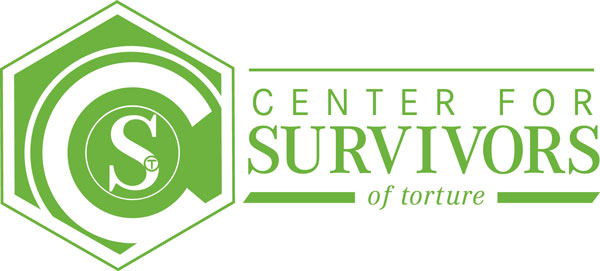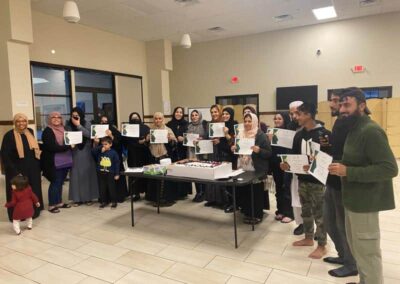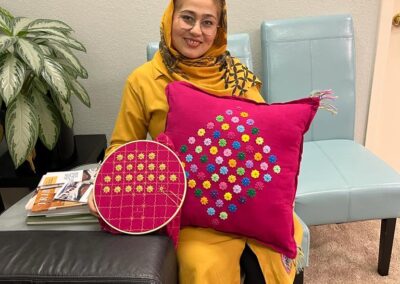Groups and Events
Group Offerings
CST hosts several group offerings. Currently, all groups are virtual and conducted over Zoom video. Should this change, we will keep you informed.
Please note that specific group offerings and schedules do change from time to time, so we recommend speaking with your CST counselor or point of contact to learn more about group availability, schedule, and how to join. For right now we will just mention that once you sign up for a group you will be added to a texting group and receive a weekly reminder about the group that will include the link to attend the group. This text message will be sent from the number (512) 352-9760. Should this procedure change in the future we will let you know.
Below is a brief summary of some of CST’s current (or recent) group offerings. Click on a title to learn more about the group. If you have additional questions about the groups, please reach out to your CST counselor or point of contact for more information.
Stress Management - Monday at 7:00pm
The purpose of the stress management group is to provide information and skills for managing stress and anxiety. The focus will be on what we can control right now to help us feel better.
Languages: English, French, Nepali
Hosted by: Juli Kramer, LCSW
Art Class - Tuesday at 10:00am
Art class meets weekly for two hours. No prior experience is necessary and all skill levels from beginner to advanced are welcome. This class is led by Vicky Maharjan. Vicky provides instruction on different art techniques while also facilitating lively conversation that routinely includes a lot of laughter. In preparation for the week, each group member will be texted a series of images in advance of the art group that you can then use to paint or draw as you practice new techniques during class and between classes. Art is another way to practice mindfulness and many people find it relaxing and healing – this class might serve as a testament to the saying that “sometimes laughter is the best medicine!”
All languages welcome, no prior experience needed
Hosted by: Vicky Maharjan
Meditation Group - Monday, Tuesday, and Wednesday at 11:00am
Meditation is an ancient wisdom tradition that over time has been incorporated in various forms by almost all major religions and spiritual traditions. CST’s weekly meditation group is welcoming of all religious and non-religious backgrounds and spiritual traditions. The objectives of this group are to promote a sense of safety and stability, facilitate healing and empowerment, enhance resilience and wellbeing, improve emotion regulation, and to create community and social connection and support. Meditation has been linked to improvements in sleep, attention, memory, emotion regulation, blood pressure and chronic pain. It has also been shown to enhance wellbeing and compassion. Meditation is simple but not easy and so we use the power of coming together in a group format to provide encouragement and support to one another as we establish a meditation practice that fits our daily lives.
Languages: English, French, Nepali, Dari, Pashto
Hosted by: Marie Carlson, PHD, Dr. Gene Bebau, Rev. Dr. Kathleen Weller
Healing Practice Group - Thursday at 9:00am
This group provides practical ways to find relaxation and feel less stress. There is a special focus on heart-centered breathing. Susan is an excellent mentor and guide for those joining.
Languages: English, French, Spanish
Hosted by: Susan Wright, Energy Healer
Mindful Movement Group - Tuesday at 10:30am
CST hosts a weekly yoga class that is open to all female identified clients. In this class we also place a special emphasis on practicing kindness towards ourselves by meeting ourselves where we are, befriending our bodies, and cultivating appreciation for hat our bodies can do.
All languages welcome.
Hosted by: Campbell Miller, Licensed Trauma-Informed Yoga Therapy Clinical Facilitator
CST also offers many more wellness groups.
Thank you very much for taking the time to learn about CST’s Groups. If you would like to join a group or if you have questions, please reach out to your CST counselor or point of contact. We hope to see you in one of our groups soon!
Images
Click on an image to enlarge.
CST’s Groups in Central Texas
At Center for Survivors of Torture — or CST as it is more commonly referred to — we see many people who have been forced to leave their countries because of threats to the health and safety of themselves or their families. These events combined with the journey to the United States and the challenges people commonly face after arrival can make it hard to adjust to a new environment and to feel like yourself. After surviving these kinds of circumstances, it is common to experience feelings of grief or anger, to have problems sleeping, having too many thoughts, forget things easily, feel very lonely and isolated, or to experience headaches or other kinds of pains.
CST’s groups focus on helping you feel better by targeting these areas using different approaches depending on the group. Some approaches emphasize practical information about community resources, others incorporate education about common reactions to distressing events, and others emphasize applying and practicing new skills to cope during highly stressful times and to enhance resilience and wellbeing. Regardless of approach, all groups recognize the importance of social connection and community and of maintaining a safe space where group members can learn from and empower one another.
Emergency and Crisis Resources
If at any time between CST group or individual sessions you find yourself feeling extremely overwhelmed, hopeless, or otherwise in distress here are some helpful resources:
- For immediate or life threatening emergency, including if you are having thoughts about killing yourself, call 911
Other helpful resources include:
- The National Suicide Prevention Hotline. Their phone number is 988.
- The Integral Care Crisis hotline. You can call this number any time of the day or night and speak with a counselor for additional emotional support. Their phone number is 512-472-4357. Once you get a person on the phone line you can request an interpreter by saying the word interpreter and then your language, or by simply repeating the name of the language that you speak if that is easier.
- For Austin Area Psychiatric Emergency Services (PES): A walk-in clinic for adults and children having a mental health crisis. Their hours are Monday – Friday 8am to 10pm and Weekends 10am-8pm. They are located in the Richard E. Hopkins Behavioral Health Building. The address is: 1165 Airport Blvd., Second Floor, Austin, TX 78701



